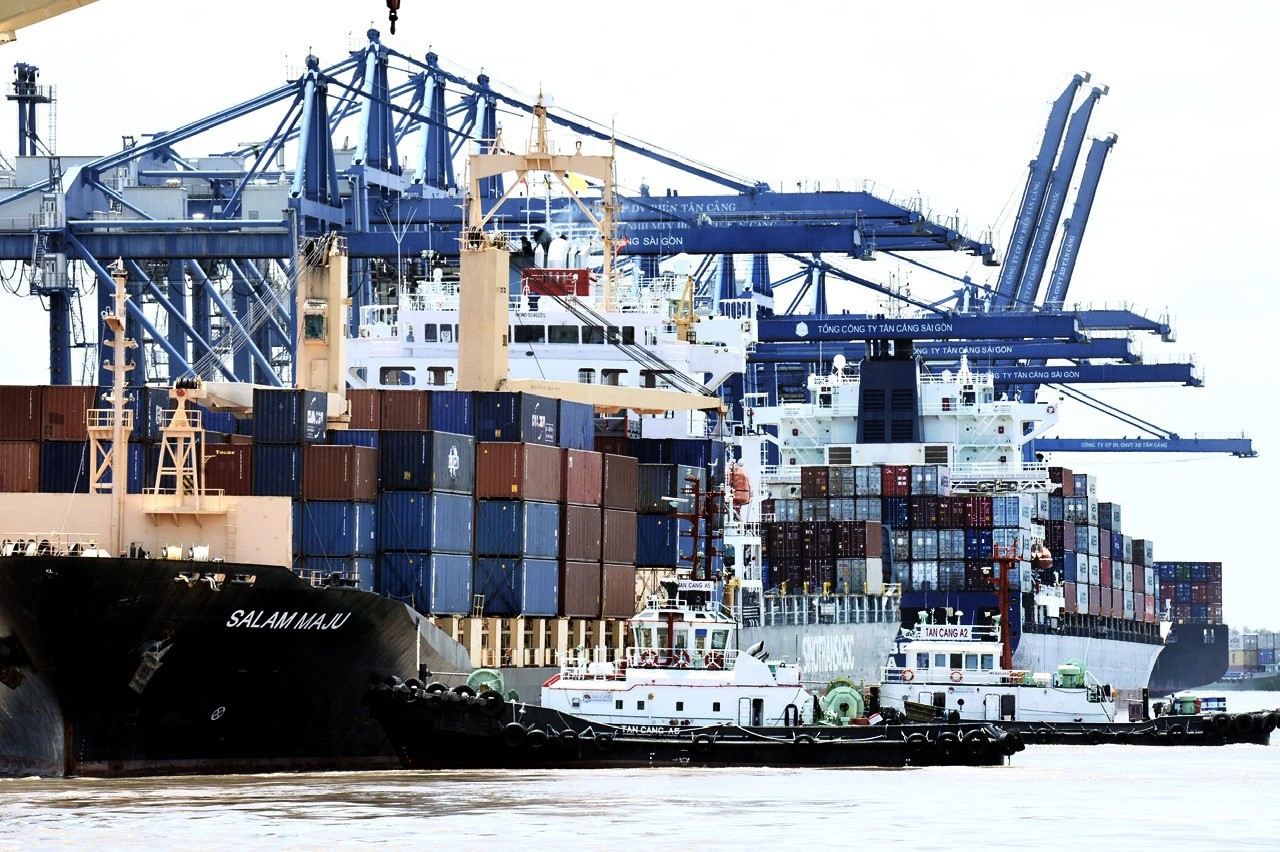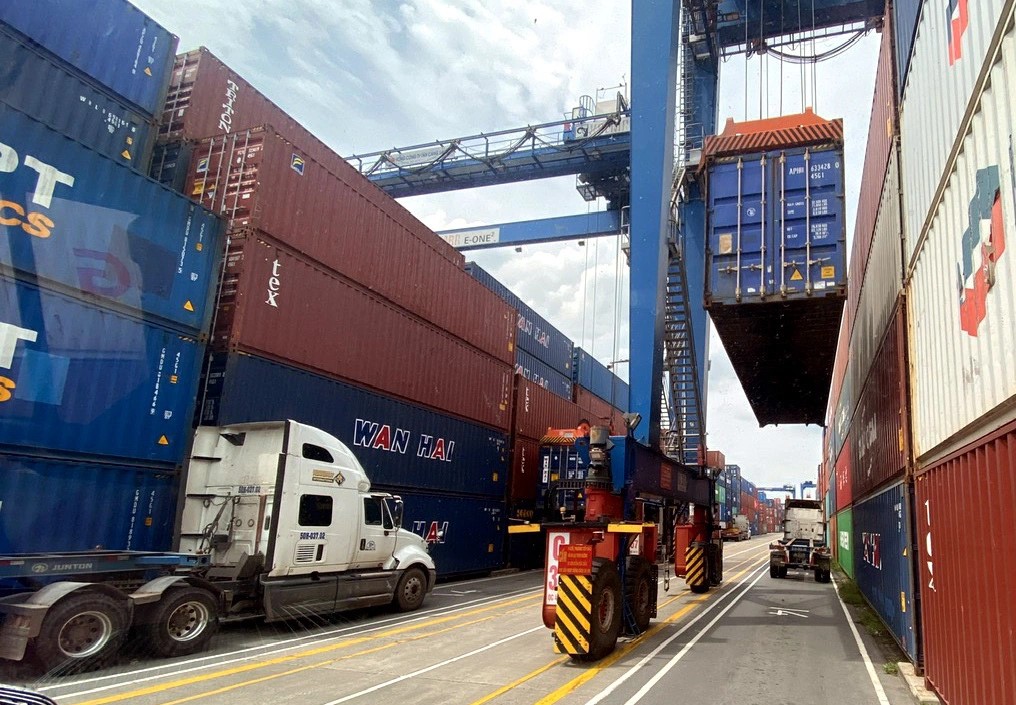Many export-import enterprises in Vietnam are struggling as ocean freight costs rise, putting significant pressure on product prices.
Furthermore, the difficulty in scheduling shipping due to a shortage of containers causes delivery delays.
Currently, local companies must pay more to have their products shipped sooner.
It would be particularly difficult if they wanted to ship goods as early as the following week.
They must book the shipping service at least one month in advance.
Struggling with delivery charges
Ngo Tuong Vy, director of Chanh Thu Company in the Mekong Delta province of Ben Tre, told Tuoi Tre (Youth) newspaper that sea freight costs had risen significantly in recent months, particularly in May, affecting exports and imports.
As a case in point, the typical ocean freight cost for a container bound for the United States is between US$6,000 and $7,000, more than double the previous figures.
Similarly, the director of an agricultural export-import company stated that the transportation cost for one container sent to Europe was approximately $4,000-5,000, which is a two- or three-fold increase from the end of last year.
Transportation to nearby regions like China, Japan, South Korea, and Southeast Asian countries has become more expensive, ranging from $1,000 to $2,000 per container.
According to the director of another agricultural export-import firm, the current fluctuation in maritime freight has placed many businesses in tricky situations on account of a significant spike in trading costs. The companies have also had challenges when dealing with their import partners.
"We need to collaborate with other businesses to book shipments more quickly and at a lower cost," the director said.
"However, the government would be required to assist export-import firms with ocean freight expenses."
The director suggested that shipping businesses and airlines consider alternative modes of transportation in order to provide more services.
According to Tran Huu Hau, deputy general secretary of the Vietnam Cashew Association (VINACAS), the main issue for businesses is that they do not know how shipping prices will change in the immediate future.
If the upward trend continues for a long period, the import partners are likely to recommend splitting the additional freight expenses for future shipments.
"So I recommend that shipping carriers be upfront and provide firms with information on relevant issues. As a result, we can have well-prepared plans and remedies to reduce potential damage," stated Hau.
Port delays have also resulted in huge financial losses for businesses.
Aside from high shipping expenses, there have been instances where firms have been surcharged by shipping lines because the freight was loaded but the ship was unable to leave the port owing to a backlog.
Loss danger looms large
A representative from a company that specializes in exporting food to the United States and Europe stated that in addition to rising ocean freight costs, reserving ships is an issue.
Because of ship shortages, cargo is forced to wait for loading for many days, if not weeks, resulting in backlogs and increased storage expenses for businesses.
Domestic ships only account for 10-15 percent of the market, covering adjacent shipping channels such as Southeast Asia and China, leaving many firms with limited options.
The majority of commodities sent from Vietnam to the United States and Europe are still handled by foreign shipping companies, according to the representative.
One representative of a shipping company in the southern region told Tuoi Tre about some of the perceived causes of the problem.
|
|
| Containers of commodities are loaded onto ships at Cat Lai Port in Thu Duc City, Ho Chi Minh City. Photo: T. Tr. / Tuoi Tre |
First, there is the impact of recent disturbances in the Red Sea, which has forced ships to shift traditional marine routes.
In addition, China has recently acquired a huge number of empty containers for the shipment of electric vehicles.
One further cause is Singapore's port congestion.
"Shipping costs could be higher. However, because the majority of current issues are transient, time-sensitive obstacles, it is anticipated that the costs will return to normal if they are resolved by the third quarter," stated the spokesperson.
According to the spokesperson, the problem of port congestion in Singapore may prompt shipping companies to relocate some ships to Vietnamese ports, providing a fresh advantage for the Vietnamese marine industry.
However, this could lead to a more competitive scenario, raising shipping prices and posing additional hurdles for businesses.
According to export-import companies, only four or five major domestic shipping companies dominate all areas of the maritime shipping industry.
In fact, if there is a risk, customers will contact the trading companies for assistance. As a result, firms would benefit from early information, allowing them to be more active in negotiating.
According to some marine experts, given the fact that the American government intends to impose higher tariffs on commodities sent from China, both Chinese exporters and American importers wish to hasten their trading operations in order to escape the new duties.
As a result, many businesses in both nations are willing to pay higher shipping prices to secure reservations or maintain containers available for their products.
"Especially, Chinese exporters' goods have allegedly been delayed at Singaporean ports, which put other trading firms in dire straits due to their weaker competitive capabilities," a marine pipe specialist stated.
Logistics companies go stressful
Logistics organizations, like trade companies, are concerned about rising shipping charges and the difficulty of making reservations.
According to related companies, China has sought vacant containers for exporting goods prior to August 1, when the United States plans to impose high tariffs on Chinese exports.
Nguyen Thanh Tuan, general director of Blue Sea Transportation in Ho Chi Minh City, said that it would be hard for businesses to book shipmens in July.
For instance, Blue Sea intends to ship 50 containers from Bangkok, Thailand to Vietnam, but has managed to book five containers only. They hope to reserve an additional 5-10 containers in August.
Instead of scheduling a ship's itinerary one month in advance, businesses must obtain weekly pricing quotes from shipping companies at the moment.
"Traders are grappling with the significantly higher ocean freight charges in exporting goods to the United States," Tuan explained.
"They have to accept higher shipping prices if they want to deliver goods swiftly.
"Furthermore, it would be impossible to plan shipping for the following week; the shipping time must be scheduled at least one month in advance."
Nguyen Hoai Chung, CEO of Phaata, a global logistics platform from Vietnam, stated that the backlog at transit ports in Singapore, Hong Kong, and Taiwan affects shipping schedules.
"Ships had to wait for three days or even 1-2 weeks after entering the transit ports, which caused disruptions." Chung said.
"Freight rates will be higher as a result."
According to Le Duy Hiep, chairman of the Vietnam Logistics Business Association, companies in the industry suffer penalties for delaying deliveries due to difficulty in scheduling ships.
Like us on Facebook or follow us on X to get the latest news about Vietnam!

















































